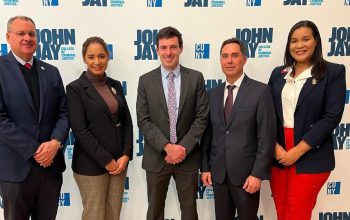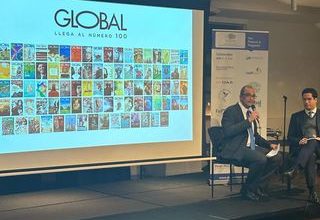news
GFDD/FUNGLODE attended the 43rd General Assembly of the Organization of American States (OAS)
June 7, 2013
Represented by Semiramis de Miranda, Projects and ICT Director, Yamile Eusebio, GFDD New York Office Director, and took part in several important meetings including the Americas Civil Society meeting with OAS Secretary General José Miguel Insulza, Minister of Foreign Affairs of Guatemala Luis Fernando Carrera, and OAS Assistant Secretary General Albert R. Ramdin. The General Assembly was held this year in Antigua, Guatemala from June 4-6, 2013.
“This year we have more than 500 invited civil society, labor, and private sector organizations which bears testimony to the importance you place on the work being done by the Organization,” Secretary General Insulza said.
They discussed the drug problem, human rights, and a range of other issues of importance to the social actors.
Theme of the OAS General Assembly
GFDD/FUNGLODE attended the gathering of the Heads of Delegation of member states where participants engaged in dialogue with representatives of civil society, workers, and the private sector on the key theme of the forty-third regular session of the General Assembly: “For a Comprehensive Policy against the World Drug Problem in the Americas.”
Guatemalan President Otto Pérez Molina, who inaugurated the regular session, stated that this
year’s Assembly will be watched throughout the world for daring to discuss “a paradigm shift that seeks substantive contributions to the global debate on drugs.”
Secretary General Insulza, who applauded the choice of the central theme, said he hoped the OAS’s recent Report on the Drug Problem in the Americas would encourage a joint search for solutions to a problem that affects all countries of the hemisphere.
Plenary Session – Draft resolutions agreed on by the Permanent Council,
Dialogue of Heads of Delegation “For a Comprehensive Policy against the World Drug Problem in the Americas”, Report of the Secretary General on the Problem of Drugs in the Americas
The OAS’s groundbreaking report, released on May 17, urged governments to consider
decriminalizing some drug use. The report, written under Mr. Insulza’s direction, is part of a growing movement to find new global strategies that focus on treatment of users and education rather than incarceration.
Guatemalan President Pérez Molina referred to the “shared responsibility” among the region’s governments to find solutions and recognize the seriousness of the problem.
The United States is not likely
to go along with this strategy. President Obama has said he welcomes discussion but does not consider legalization to be a solution. Secretary of State John Kerry, who attended the meeting in Guatemala, echoed those views.
As the 2-day summit progressed, there were hints of disagreement among the 34 member delegations amid behind-the-scenes efforts to draft a statement embodying the group’s will.
"The U.S. does not claim a monopoly on
best practices" for dealing with the drug problem, American ambassador to the OAS, Carmen Lomellin, told assembled members. "We cannot arrest and incarcerate our way out of the problem. At the same time, we cannot see legalization as a solution."
Guatemala’s Foreign Minister Fernando Carrera said there was consensus on the continent that it is time to “sit down and review what is not working in the current anti-drug
strategies.” He added that the Assembly’s final document will, for the first time ever, express the need to open a debate on how to deal with drug problems “from a scientific, not ideological, point of view.”
GFDD/FUNGLODE Attends Panel “Women and Drugs in the Americas: A diagnosis in the making.”
The Inter-American Commission of Women (CIM) organized a panel and
round-table discussion, held on June 3rd, to analyze and debate the gender dimensions of the drug industry. The panel examined the growing role of women in drug trafficking.
The OAS has expressed concern at the growing incidence of women being arrested for drug-related crimes in the Americas. Secretary General Insulza, opening the roundtable, said, “the issue of drugs has a strong gender dimension that is still very visible in the investigations and
reports produced to date.”
Forced by poverty, inequality and lack of opportunity, a growing number of women and children are involved in drug-related crimes, said the panel’s keynote speaker, Guatemalan Vice President Roxana Baldetti.
Vice President Baldetti described most women in prison as “young, poor, illiterate, single mothers,” who are often arrested for trying to take drugs into prisons for their partners.
Furthermore, she noted, while 48 percent of women in prison in Latin America are there for drug-related crimes, the figure for men is just 15 percent.
Maureen Clarke, president of the CIM, presented a preliminary analysis on the situation of women and the drug problem, including the role of gender violence: “Women and Drugs in the Americas: A Working Assessment.”
Ms. Clarke pointed to the social problems stemming from the
incarceration of women, saying that when a man is incarcerated, the family generally remains together, but when a woman is sent to jail the family usually falls apart. She therefore called for “a more comprehensive perspective on what incarcerating women entails.”
Panelists and participants discussed the benefits of tackling the drug problem as a public health question rather than a security issue with policies for prevention, treatment and
rehabilitation.
Meanwhile, the Permanent Observer of Spain to the OAS, Javier Hevia, said that “it is important to find a gender perspective in anti-drug policies,” adding that in Spain, “of the 6,500 female inmates, 45 percent are arrested because of drug problems.” Ambassador Hevia, who hosted the event, said “promoting women’s rights and gender equality is a key development objective of the Master Plan for
Spanish Cooperation 2013-2016.”
Legal Policies Regarding Disabilities
GFDD/FUNGLODE attended a regional, one-day seminar with experts and practitioners on disability rights from throughout the hemisphere, hosted by Washington-based The Trust for the Americas (www.trustfortheamericas.org). Participants engaged in a discussion about best
practices, challenges and opportunities in the implementation of Article 12 of the UN Disability Convention, and its interplay with current OAS resolutions and conventions on disability.
A diagnosis and appraisal of the rights of persons with psychosocial disabilities was developed for this forum in addition to ten national seminar/workshops, which were held in Argentina, Chile, Colombia, Mexico, Paraguay and Peru. Among the seven recommendations released at the end of
the forum, the declaration (as a first draft), states: “It is necessary that States promote policies and actions that ensure the dignity and respect for the rights of persons with psychosocial disabilities, eradicating all forms of stigmatization, discrimination and abuse such as forced hospitalization/commitment, isolation, abandonment, mistreatment, torture, over-medication and medical experimentation. They must be guaranteed alternative outpatient care and support based in
their own communities as well as equal and decent access to treatment and medications required for independent community living.
With the support of Jean Michel Arrighi, Secretary for Legal Affairs of the OAS; Dr. Gustavo Mendizabal, Judge on Guatemala’s Supreme Court of Justice and Dr. Emilio Álvarez Icasa, Executive Secretary of the OAS Inter-American Commission on Human Rights, the seminar conclude with words of encouragement and support for this
important debate in the Americas.
Resolution Adopted
The OAS General Assembly adopted the Inter-American Convention against Racism, Racial Discrimination, and Related Forms of Intolerance and the Inter-American Convention against All Forms of Discrimination and Intolerance and opened them for signature.
Related links
http://www.oas.org/en/43ga/
General Information
http://www.oas.org/en/43ga/press_manual.asp






